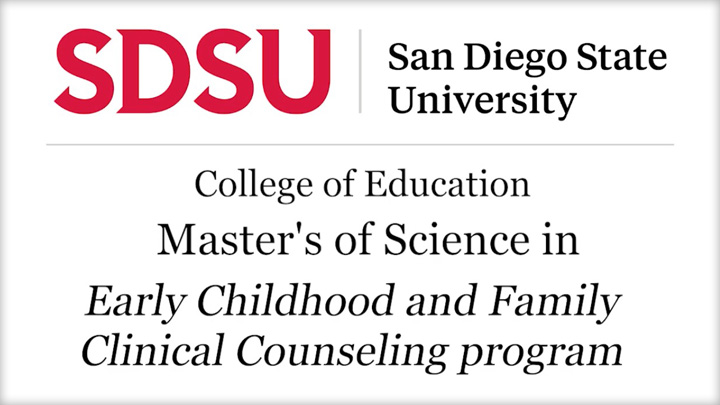Early Childhood and Family Clinical Counseling
Master of Science (M.S.) and LPCC
Contacts
Program Questions
[email protected]
Application Questions
[email protected]
Graduate Advisor
Sarah Rieth
The Master of Science (M.S.) in Early Childhood and Family Clinical Counseling utilizes a neurorelational (theoretical) framework to prepare competent, transdisciplinary psychotherapists to work with infants, young children, and their families.
The program is designed to prepare students who wish to pursue clinical licensure under the Board of Behavioral Sciences- Licensed Professional Clinical Counselor (LPCC). Additionally, the program provides a specialization to prepare clinicians for practice in the field of early childhood mental health. The LPCC concentration fulfills the coursework and clinical practicum requirements for licensure through the Board of Behavioral Sciences (BPC4999.33).

The program is designed as a 2-year program (12 units a semester and 6-9 units completed during summer sessions). However, students may choose to complete the program part-time with approval from the program graduate adviser. Note that part-time status will increase the length of the degree program.

Admissions
The Child Development M.S. program accepts applications for Fall admission only.
Requirements
- A bachelor’s degree (Child Development or related fields preferred)
- Grade point average of at least 3.0 in the last 60 semester units attempted
- Completion of prerequisite courses:
- Human or Child Development
- Psychology or Abnormal Psychology
- English language reading and writing proficiency
For application due dates, instructions, and a full list of required program-specific documents visit:
How to Apply
Master's Degree Program Requirements
To earn the Master’s, the student must complete, an official program of study that includes a minimum of 60 units of 500-, 600- and 700-numbered required and elective courses (up to 15 units can be taken from 500 level courses with the approval of the adviser) that meet the 13 core content area as outlined by the licensure requirements, including six units (2 semesters) of supervised clinical practicum, and a passing score on the department clinical comprehensive exam. These activities are completed under the advisement of the M.S. ECFC Program Director and Graduate Advisor.
Program requirements include:
- (A) 39 units of core content coursework (13 semester courses)
- (B) 15 units of advanced content coursework (5 semester courses)
- (C) 6 units of supervised practicum (2 semester courses)
- (D) Successful completion of the department’s comprehensive clinical exam in the final semester of the program
See details of each requirement below:
To fulfill the educational requirements to qualify for California state licensure in LPCC, students need to complete the following courses as aligned with the core content areas of the BBS requirements:
- Counseling and psychotherapeutic theories and techniques (3 units) — CFD 634B - Seminar in Counseling Theories and Techniques (3)
- Human growth and development across the lifespan (3 units) — CFD 670B - Seminar in Human Development Theories- Intervention and Prevention Lifespan Approach (3)
- Career development theories and techniques (3 units) — CFD 660A - Seminar in Early Childhood Mental Health Career Development (3)
- Group counseling theories and techniques (3 units) — CSP 670 and 670L: Theory and Process of Group Counseling (3)
- Assessment, appraisal and testing (3 units) — CSP 623: Ecobehavioral Assessment-Intervention (3)
- Multicultural counseling theories and techniques (3 units) — CSP 615 - Seminar in Multicultural Dimensions in Counseling (3)
- Principles of diagnosis, treatment planning and prevention of mental and emotional disorders and dysfunctional behavior (3 units) — SWORK 720: Seminar in Selected Topics in Human Behavior and Social Environment - Psychopathology (3) OR CSP 618: Mental Health Recovery and the DSM: a social justice perspective (3)
- Research and evaluation (3 units) — ED 690 - Methods of Inquiry (3)
- Professional orientation, ethics and law in counseling, including California law and professional ethics (3 units) — CFD 660B - Seminar in Professional Law and Ethics in Counseling (3)
- Psychopharmacology (includes biological bases of behavior) (3 units) — CSP 694 - Psychopharmacology for Marriage and Family therapists and LPCC (3)
- Addictions counseling (includes substance abuse, co-occurring disorders) (3 units) — CSP 687 - Family and Systemic Treatment of Substance Abuse (3) OR SWORK 758: Alcohol and Drug Problems - Identification and Intervention (3)
- Crisis/Trauma Counseling (includes multidisciplinary responses to crises, emergencies or disasters) (3 units) — CSP 650 - Trauma and Crisis in Multicultural Community Context (3)
- Advanced counseling and psychotherapeutic theories and techniques (3 units) — CFD 634A - Family Therapy Theory and Techniques (3)
Students must complete a minimum of 15 semester units of advanced coursework to develop knowledge of specific treatment issues or special populations. These units may not be repeated from the above core content areas and must include the three courses below, in addition to 2 additional electives.
- CFD 673A - Neurorelational Framework for Early Childhood Mental Health Treatment (3)
- CFD 673B - Early Childhood Intake Assessment, Diagnosis, and Treatment Planning (3)
- CFD 673C - Therapeutic Skills and Techniques for Early Childhood Mental Health (3)
Students must complete no less than six (6) semester units of supervised practicum or field study experience, or the equivalent, in a clinical setting that provides a range of professional clinical counseling experience, including the following:
CFD 792 - Advanced Clinical Experience and Group Supervision - 6 units
- A minimum of 280 hours of face-to-face supervised clinical experience counseling individuals, families, or groups. However, students typically gain 500 or more hours during the practicum year.
- Experience in applied psychotherapeutic techniques; assessment; diagnosis; prognosis; treatment; issues of development, adjustment, and maladjustment; health and wellness promotion; professional writing, including documentation of services, treatment plans, and progress notes; how to find and use resources; and other recognized counseling interventions.
Professional Liability Insurance: All students must purchase professional liability insurance, while enrolled in CFD 792, in order to participate in the clinical experience component of the program. A background check clearance, fingerprinting clearance, and a negative TB test are also required.
Successful completion of the department comprehensive clinical exam at the end of the academic program:
CFD 799C - Clinical Comprehensive Exam.
Requirements for LPCC Licensure
- Postgraduate Supervised Experience: Upon completion of the degree, students wishing to pursue LPCC licensure need post-degree supervised experience of 3,000 hours over a period of no more than 2 years including not less than 1,750 hours of direct counseling with individuals or groups in a clinical mental health counseling setting and 150 hours in a hospital or community mental health setting.
- Examination: Passing score on the National Clinical Mental Health Counselor Examination (NCMHCE), recently adopted as the licensure exam for California LPCCs, and the California Law and Ethics Exam (CPLEE). Both exams are administered by the BBS (Board of Behavioral Sciences).
Detailed Program Information
Program Mission
The mission of the Master's of Science in Early Childhood and Family Clinical Counseling is to prepare knowledgeable and skilled mental health clinicians to utilize a neuro-relational framework and work with diverse populations. The program prepares competent, transdisciplinary clinicians, with a specialization in early childhood mental health, who recognize the value of self-reflection and cultural humility in their approach to clinical interactions. While candidates will gain the knowledge and experience to work with individuals across the lifespan, the mission of this program is to prepare mental health clinicians who work to support the social-emotional health and development of infants, young children, and their families.
Program Philosophy
Our faculty believe that early supportive relationships and a healthy attachment are the foundation for development. We believe that very young children have unique developmental and relational needs and that all early learning occurs in the context of relationships. Therefore, candidates in our program receive a strong foundation in developmental knowledge with an emphasis on the early years (birth to eight years) to better understand the unique needs of young children.
Family-centered practice is a guiding principle of the M.S. ECFC program. Since development and learning occur in the context of relationships, working with young children and their families must also be relationship-based. Relationship-based work requires us to engage our emotions as well as our intellect and to consider how a client’s past as well as the clinician’s past affects their present reality. To provide client and family-centered care, we believe that a clinician must reflect on their own values and beliefs to understand how their perspective can influence the care they provide. Through reflective practice, candidates in our program learn how to develop intentional, authentic relationships with their clients.
Our faculty promote an overarching concept of diversity, namely, that diversity is the inclusion, consideration, and respect of varying cultures, religions, ability, sexual orientations, gender expressions, ethnicities, viewpoints, values, and experiences of the individuals who make up our world. Students and faculty in the program come from a variety of backgrounds and subscribe to a wide range of values and beliefs in their personal and professional lives. This program aims to teach students how to hear, reflect on, and value the multiple viewpoints and experiences of diverse populations. Students are expected to show a willingness to develop the skills to work with all types of children, adults, or families and to approach clinical and educational interactions with cultural humility.
The scope of practice for Licensed Professional Clinical Counselors (LPCCs)
The scope of practice for Licensed Professional Clinical Counselors (LPCCs) includes the assessment and treatment of individuals and groups. It does not include the assessment or treatment of couples or families unless the LPCC meets specific qualifications defined in California law (BPC4999.33) as follows:
- Six (6) semester units or nine (9) quarter units specifically focused on the theory and application of marriage and family therapy OR a named specialization or emphasis area on the qualifying degree in marriage and family therapy; marital and family therapy; marriage, family, and child counseling; or couple and family therapy.
- No less than 500 hours of documented supervised experience working directly with couples, families, or children.
- A minimum of six (6) hours of continuing education (CE) specific to marriage and family therapy during each license renewal cycle. The six (6) hours will count toward the required overall 36 hours of CE.
The M.S. ECFC program of study will fulfill the 6 semester units of coursework covering the theory and application of marriage and family therapy.
Frequently Asked Questions
You apply for a Fall admission, but the program actually starts in the Summer. The first day of the summer term is normally in late May.
No. This is a fully in-person program, so remote learning is not an option.
The program consists of 60 units and takes 2 full years to complete, including summer courses.
While class scheduling is subject to change based on factors out of our control, we do our best to offer our courses 2-3 nights per week, with classes starting no earlier than 4pm. Once you start your practicum in your second year, you will have classes no more than 2 nights per week.
Yes. You will start your practicum hours in the summer (or occasionally the fall) of your second year in the program.
SDSU Resources for Future Students
Early Childhood and Family Clinical Counseling
Master of Science (M.S.) & LPCC
